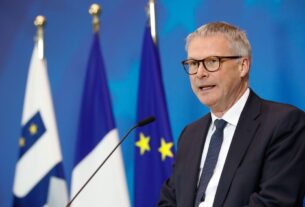The starting gun has been fired in the race to secure enough gas this winter and the stakes couldn’t be higher — whether the EU is able to free itself of Russian domination or whether the Kremlin can inflict enough pain on the bloc to undermine its support for Ukraine.
The key is whether the EU has enough gas on hand to ride out any blackmail efforts by Russia, which is why the EU wants member countries to fill their gas storage to 80 percent of capacity by November 1. The European Parliament on Thursday backed the plan.
But the Kremlin is well aware of the risk of the EU succeeding.
Gas flows are falling rapidly, with 12 EU countries noting complete or partial shutoffs of Russian gas.
“The risk of a full gas disruption is now more real than ever before,” Commission Vice President Frans Timmermans told MEPs Thursday. “That is why the adoption of the gas storage regulation … is so important at this moment.”
“All this is part of Russia’s strategy to undermine our unity,” he added.
The EU is ahead of schedule in filling gas reserves for an ordinary year, with countries starting to load up a month ahead of schedule. Total gas storage across the bloc is currently filled to around 55 percent of capacity.
But this is no ordinary year.
Last week, Gazprom reduced gas flows to 40 percent of capacity along the Nord Stream pipeline, citing an equipment issue caused by Western sanctions, affecting deliveries to France, Italy, Austria and Germany.
Moscow insists the reduced flows are a purely technological issue, with Kremlin spokesman Dmitry Peskov saying Thursday there was “no hidden agenda” behind the move.
EU countries don’t buy the Kremlin’s explanation.
On Thursday, Berlin triggered stage two of its three-stage emergency gas alert system — one step short of taking control of energy distribution and rationing gas supply. It has also pledged to fire up its coal plants temporarily, as have Austria and the Netherlands.
“We must not delude ourselves, cutting gas supplies is an economic attack by Putin on us,” said Vice Chancellor Robert Habeck, who warned of tough times ahead. “It will be a rocky road that we as a country now have to walk. Even if you don’t really feel it yet: we are in a gas crisis.”
Gas flows will fall even further next month when Russia shuts down Nord Stream for what it says is regular maintenance.
Russia’s fading leverage
If Russia continues shipping gas, the EU could meet its storage target by October, said Simone Tagliapietra, a senior energy researcher at the Bruegel think tank. But if Moscow turns off the taps, meeting the target will be “super challenging,” he said.
That’s because alternative supplies cannot make up for Russian deliveries, argued Thomas Rodgers, an energy analyst at the ICIS consultancy. A record total of 12.6 billion cubic meters of gas will enter Europe from countries outside of Russia in 2022, according to ICIS modeling, compared to the 25 bcm that arrived from Moscow in the first half of this year.
“The extra gas that they can give Europe, they’re already giving,” he said, “any additional gas supplies aren’t going to come anytime soon.”
If imports from Russia stop, he said European nations will be forced to ration gas, starting with industry and followed by power generation and residential uses.
The race to secure enough gas storage may also affect the outcome of the war in Ukraine.
“Russian leverage is not that great,” said Alexander Gabuev, a senior fellow at the Carnegie think tank. “It doesn’t have that many great cards to play and gas is obviously the card that the Kremlin has.”
If Moscow can hurt the EU’s economy by shutting off gas supplies, Gabuev said, this may chip away at public support for bankrolling Ukraine’s war effort. If the EU does meet its gas storage targets, EU countries are likely to keep sending cash and weapons to Kyiv.
This makes a cut-off likely.
“The probability is very high — it’s almost 100 percent,” said Mikhail Krutikhin, co-founder of the independent consulting agency RusEnergy and a leading expert on Russian gas export monopoly Gazprom.
“Putin would prefer to use Gazprom as a weapon right now,” he said, rather than run the danger of the EU filling up its storage.
“I think that Putin will be prepared to sacrifice Gazprom,” he said, adding that such a move would likely result in around 200,000 job losses domestically and cut the 7 percent of the federal budget that comes from gas revenues.
Krutikhin estimated a shutoff could come as quickly as July or August, allowing Russia to exert maximum pressure on the bloc while giving Moscow enough time to see how decisive battles are playing out in eastern Ukraine.
The weather will also come into play.
If next winter is a cold one, ICIS’s Rodgers said that would not be enough to get EU countries through a heating season even if they’ve hit the 80 percent storage target.
“In anything but the warmest and the most modest of winters, this would make things extremely tight in terms of the gas market,” he said.
This article is part of POLITICO Pro
The one-stop-shop solution for policy professionals fusing the depth of POLITICO journalism with the power of technology
Exclusive, breaking scoops and insights
Customized policy intelligence platform
A high-level public affairs network





